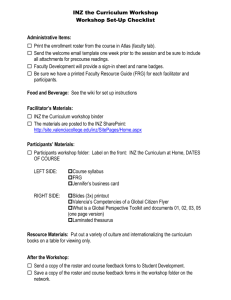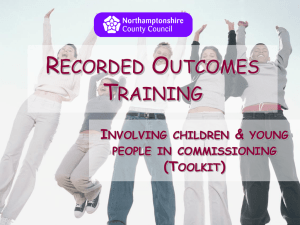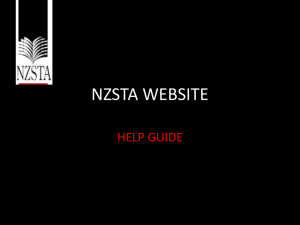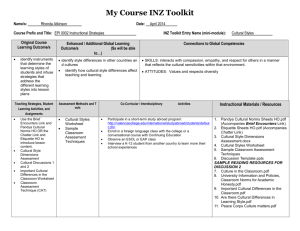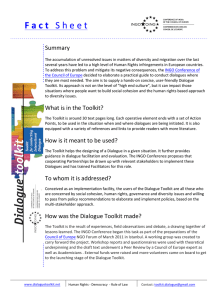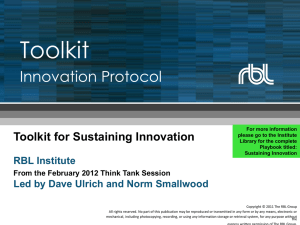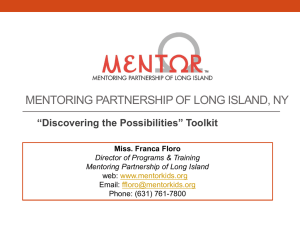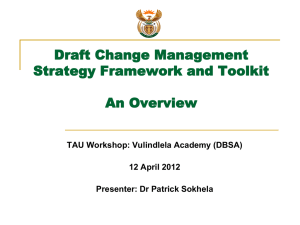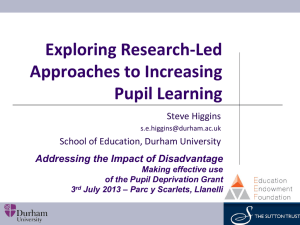0.1_Course Syllabus_INZ the Curriculum 2014 v3
advertisement
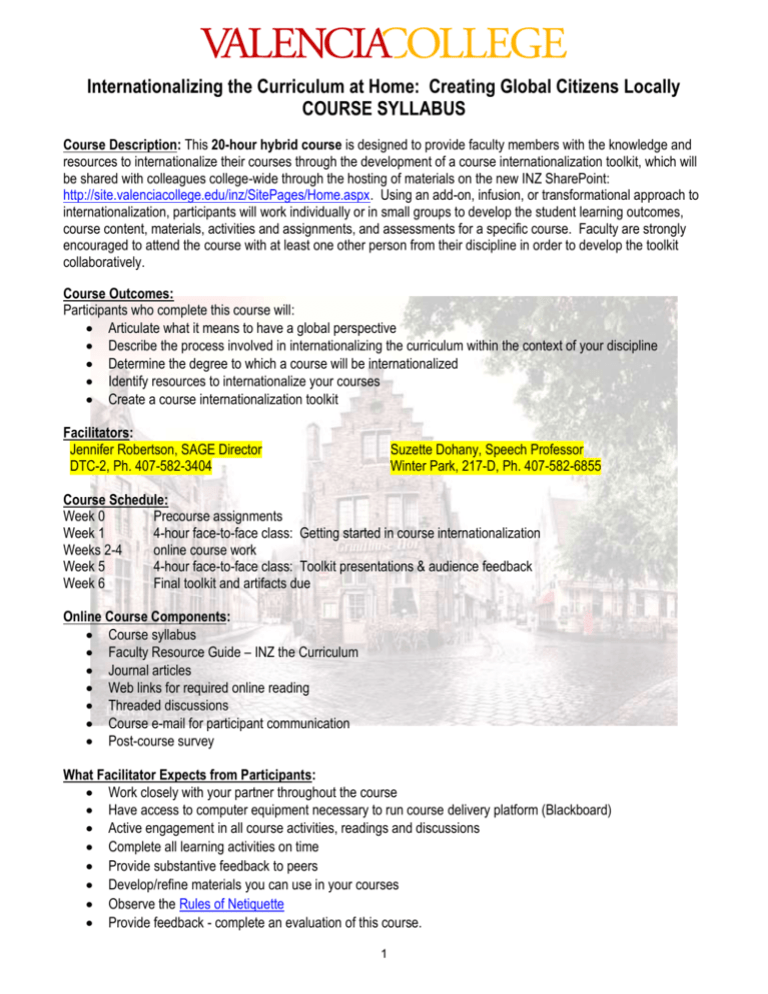
Internationalizing the Curriculum at Home: Creating Global Citizens Locally COURSE SYLLABUS Course Description: This 20-hour hybrid course is designed to provide faculty members with the knowledge and resources to internationalize their courses through the development of a course internationalization toolkit, which will be shared with colleagues college-wide through the hosting of materials on the new INZ SharePoint: http://site.valenciacollege.edu/inz/SitePages/Home.aspx. Using an add-on, infusion, or transformational approach to internationalization, participants will work individually or in small groups to develop the student learning outcomes, course content, materials, activities and assignments, and assessments for a specific course. Faculty are strongly encouraged to attend the course with at least one other person from their discipline in order to develop the toolkit collaboratively. Course Outcomes: Participants who complete this course will: Articulate what it means to have a global perspective Describe the process involved in internationalizing the curriculum within the context of your discipline Determine the degree to which a course will be internationalized Identify resources to internationalize your courses Create a course internationalization toolkit Facilitators: Jennifer Robertson, SAGE Director DTC-2, Ph. 407-582-3404 Suzette Dohany, Speech Professor Winter Park, 217-D, Ph. 407-582-6855 Course Schedule: Week 0 Precourse assignments Week 1 4-hour face-to-face class: Getting started in course internationalization Weeks 2-4 online course work Week 5 4-hour face-to-face class: Toolkit presentations & audience feedback Week 6 Final toolkit and artifacts due Online Course Components: Course syllabus Faculty Resource Guide – INZ the Curriculum Journal articles Web links for required online reading Threaded discussions Course e-mail for participant communication Post-course survey What Facilitator Expects from Participants: Work closely with your partner throughout the course Have access to computer equipment necessary to run course delivery platform (Blackboard) Active engagement in all course activities, readings and discussions Complete all learning activities on time Provide substantive feedback to peers Develop/refine materials you can use in your courses Observe the Rules of Netiquette Provide feedback - complete an evaluation of this course. 1 What Participants Can Expect from the Facilitators: Prompt responses to your questions and emails Regular monitoring of course website Thoughtful discussion facilitation (involvement may be limited to encourage discussion with course peers) Prompt action on technical problems within facilitator’s control, such as broken links, file size, discussion settings, etc. Respect for participants’ area of expertise, ideas and opinions How Participants Will Be Evaluated: You will be evaluated in terms of your participation in and completion of the assignments as outlined in the course calendar. Valencia requires 100% completion of the following activities to receive credit for this course: Complete all assignments, discussion posts, and projects within the established deadline dates. Post substantive information to the discussion board as required. Reply with substantive, original comment(s) to each discussion board post as required to contribute to a rich and deep discussion. Complete the final presentation and project within the established guidelines. Complete the course evaluation survey. Overall Grading: 4 original discussion posts, 5 points each (20 pts) 8 response discussion posts for peer feedback, 3 points each (24 pts) In-class toolkit presentation (12 pts) Final toolkit and artifacts submission (50 pts) Total 106 pts You must obtain 75 points and submit a completed toolkit with artifacts in order to pass the course. In-Class Project Presentation OR Video Presentation: If you cannot attend the last class, you can video record your presentation and send to the facilitators prior to the last class meeting. Keep within the 10-minute summary / 5-minute Q&A time limit (4 pts) Effectively summarize the objectives, learning activities, and assessment methods of your course INZ project (4 pts) Show the toolkit document, artifacts, and other visuals on the screen (handouts are optional) for demonstration purposes (4 pts) Final Course Project: Participants will create a course internationalized toolkit in a format that OTHER faculty can use if they want to infuse the material into their lesson. The final project should include the following (50 points): 1. Completion of the toolkit template with all the fields completed using the instructions provided. 2. A minimum of 6 artifacts that a faculty member would need to teach the unit. They should be written in an organized and detailed format that another professor can follow. Examples of artifacts include: PowerPoint presentations, lecture notes, lesson plan, assessment rubric*, student handouts, references to reading materials, online videos, case scenarios, etc., and a final assessment*. *REQUIRED 2 Course Calendar for INZ the Curriculum 2014 Week Week 0: Type Topics On your own Pre-course Work (send 2 weeks prior) Assignments Review Week 0 in BlackBoard Due 10/24 Read An Attainable Global Perspective by R. Hanvey. Read the Executive Highlights (pp. 1-6) of College Learning for the New Global Century. Read Where Faculty Live: Internationalizing the Disciplines by ACE. Print out the official course outline of the course you will be internationalizing and bring it to the first class. Week 1: Friday, 10/24/14 1pm-4pm F2F Meeting What Does It Mean to Have a Global Perspective? Review Week 1 in BlackBoard Getting Started in Curriculum INZ DISCUSSION POST #1: Complete Activities 1 and 2 in the FRG. Copy into one Word document and post to BB. East 3-113 Week 2: Read Sections I and II and Appendix I of the INZ Faculty Resource Guide (FRG). DISCUSSION POST #1 RESPONSE: Review the posts of 2 colleagues (not a partner) using the Peer Feedback Form and post a comment to each one about his or her project. Ask a question, make an observation, and/or offer a suggestion. Ensure that there is a clear link to the global competencies. Online 10/27 – 10/31 Creating a Course INZ Toolkit Faculty Resources 10/31 11/5 Read sections III and IV and Appendices II, III, IV, V of the FRG. Watch the Valencia faculty videos and make note of the ideas you can use. Begin researching what is already created & what you need to create by visiting the INZ SharePoint. Review the library articles, Internet links, and existing toolkits. DISCUSSION POST #2: Complete Activity 3 in the FRG. Copy into a Word document and post to BB. DISCUSSION POST #2 RESPONSE: Review the posts of 2 colleagues (not a partner) using the Peer Feedback Form and post a comment to each one about his or her project. Ask a question, make an observation, and/or offer a suggestion. Week 3: 11/3-11/7 Online Course Activities & Materials 11/7 11/12 Begin developing your artifacts for the toolkit (course materials). You need a minimum of 6 total and you must include a final assessment and scoring rubric in the final draft. DISCUSSION POST #3: Post a minimum of 3 artifacts in BB that will be used in your toolkit and be sure to explain how they will be used. DISCUSSION POST #3 RESPONSE: Review the posts of 2 colleagues (not a partner) and post a comment to each one about his or her artifacts. Ask a question, make an observation, and/or offer a suggestion. 3 11/14 11/19 Week Week 4: Type Online Topics Assessment 11/17-11/21 IEW! 11/24-11/28 Read the resources posted in BB. DISCUSSION POST #4: Post the assessment and rubric in BB. 11/21 DISCUSSION POST #4 RESPONSE: Review the posts of 2 colleagues (not a partner) and post a comment to each one about his or her assessment and rubric. Ask a question, make an observation, and/or offer a suggestion. 11/25 Online & F2F Presentations & Feedback F2F – Be prepared to give a summary of your project to the group and answer questions. You will need to pull up your toolkit and all the documents you have created so far on the projection screen. You can also be creative with your presentation if you want to! The purpose of these presentations is to elicit further feedback from the audience that you can integrate into your final toolkit submission. Presentations will be a maximum of 10 minutes with a strict time limit. 11/21 Online Final Project Submission Follow the instructions on how to prepare the final toolkit and artifacts. 11/28 Post Course Survey Submit your final toolkit and all artifacts at the FINAL PROJECT SUBMISSION link in BB. Friday, 11/21/14 9am-12pm West TBD Week 6: Due Develop your summative assessment and rubric. 11/10-11/14 Week 5: Assignments Submit your course evaluation at the COURSE EVALUATION link. This course evaluation provides valuable feedback for improving the course next term. Thank you for taking the time to complete it! 4 FREQUENTLY ASKED QUESTIONS 1. How is an Online Course Different from a Face-to-Face Course? It can feel overwhelming—especially in the first week. You’ve probably forgotten how ill-at-ease you felt when you first went to high school, but taking an online class for the first time is very similar. It takes a while to learn your way around the “virtual campus”. It fits more easily into your schedule. However, since you will do most of your work at home, it requires more self-discipline in setting aside time to study and participate in the course’s learning activities. As in any course in which you want to do well, this course will take more time than you expect. All reminders of when things are due are electronic. If you don’t access the course regularly, you may miss key assignments and due dates. You will collect, reflect on, and respond to information that you have gathered. In an online course, responsibility for learning rests equally on participants and facilitators. It works best when you enjoy using technology and interacting with others online. 2. What do Participants Need to Be Successful? Access to a computer with a high-speed connection Basic computer skills, such as the use of word processing software, sending email with attachments, uploading and downloading files from external sources A preference for visual or kinesthetic learning, because online learning is very visual and very “hands on the keyboard” (If you don’t know your preference, take the online version of the Barsch Inventory to find out.) An open-minded attitude, personal honesty, and a willingness to share your knowledge and ideas with others The belief that online learning is more convenient, but not easier than face-to-face learning The belief that quality learning can happen anytime and anywhere An interest in self-reflection From: The Virtual Student by Palloff and Pratt 3. What Makes a Good Discussion Posting? Substantial- thoughtful, original, relevant and contributes to the overall learning of the group Thought-provoking- stimulates thinking and reasoning Timely- post early to give your peers time to respond, this contributes to a rich discussion Logical, concise and grammatical Conveys “your presence”- reinforce your conclusions with real life and professional experiences 4. What are Some Additional Tips for Success in This Course? Install the Firefox browser (recommended for Blackboard) before the course begins. Print a copy of the course syllabus and calendar. Keep it by your computer. Work offline if you prefer-print your assignments and read them offline, use a word processor to compose your work before posting them to the course. Check the course website and course email regularly. If you have a question, post it on the “Ask Your Facilitator” discussion board. Often a colleague will have a good answer for you. Set aside specific times each week to complete class activities. If not, your other work will expand to fill all the time you have. Expect electronic glitches/power outages and plan ahead. Don’t wait until the last minute to submit your work. Maintain back-up copies of all of your coursework on a flash or jump drive. 5. Who Do I Contact If I Have Questions? Course Issue - Contact your facilitator Technical Issues – Contact Technical Support or call at 407-582-5600. Resources and Copyright: All of the resources within the workshop are intended for the use of the participant during the course and may be used personally after the course is completed. However, all resources are the property of Valencia College and its cooperating authors, and may not be offered via the internet or other means to persons not having completed this workshop, for profit or any other informational use. 5
